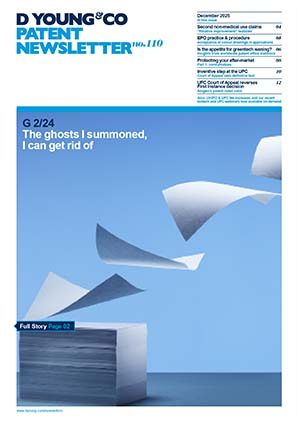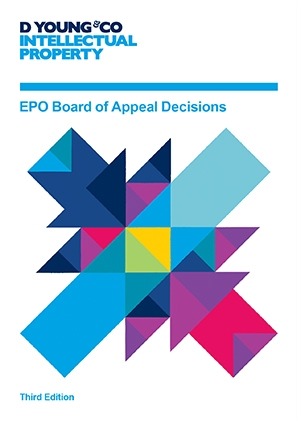G 3/19: plants produced by essentially biological processes are excluded from patentability
The Enlarged Board of Appeal has handed down its decision regarding the allowability of product and product-by-process claims in which the product is exclusively obtained by an essentially biological process.
The main judgment is as follows: “Taking into account developments after decisions G 2/12 and G 2/13 of the Enlarged Board of Appeal, the exception to patentability of essentially biological processes for the production of plants or animals in Article 53(b) EPC has a negative effect on the allowability of product claims and product-by-process claims directed to plants, plant material or animals, if the claimed product is exclusively obtained by means of an essentially biological process or if the claimed process features define an essentially biological process”.
Whilst this is not a favourable outcome for applicants, there is some positive news as the Enlarged Board of Appeal also decided that: “This negative effective does not apply to European patents granted before 1 July 2017 and European patent applications which were filed before that date and are still pending.”
The reason for this distinction is that the Enlarged Board of Appeal’s current decision to change its previous interpretation of Article 53(b) EPC was based on new Rule 28(2) EPC, which came into force on this date.
Previous interpretations of Article 53(b) EPC
The Enlarged Board of Appeal has provided interpretations of Article 53(b) EPC on a number of previous occasions (see G 1/98, G 2/07 & G 1/08, G 2/12 and G 2/13).
Article 53(b) EPC itself states: “European patents shall not be granted in respect of:…plant or animal varieties or essentially biological processes for the production of plants or animals; this provision shall not apply to microbiological processes or the products thereof…”
Following G 2/12 and G 2/13, it appeared that the Enlarged Board of Appeal had provided a comprehensive analysis of Article 53(b) EPC. Notably, in G 2/12 and G 2/13 it explicitly held that Article 53(b) EPC did not negatively impact the allowability of product claims directly obtained or defined by an essentially biological process.
However, these decisions faced criticism from a range of groups - including lobbying groups and certain national governments - who considered that the extent of patent protection available in this field should be limited.
The European Commission (EC) subsequently adopted a notice on certain articles of the Biotech Directive (Notice 2016/C 411/03). In this notice, it was considered that in trying to assess the intentions of the EU legislator when adopting the Biotech Directive, the relevant preparatory work to be taken into consideration was not the work that preceded the signature of the European Patent Convention (EPC) in 1973, but the work relating to the adoption of the Biotech Directive.
The EC concluded that the legislator’s intention when adopting the Biotech Directive was to exclude from patentability products obtained by means of essentially biological processes. Accordingly, the EC considered that the rulings in G2/12 and G2/13 to allow claims to products obtained from an essentially biological process were contrary to the intentions of the Biotech Directive.
As a result of the EC’s notice, on 01 July 2017 the EPO’s Administrative Council issued Decision (CA/D 6/17) to add Rule 28(2) EPC, which states: “Under Article 53(b), European patents shall not be granted in respect of plants or animals exclusively obtained by means of an essentially biological process.”
This caused a direct conflict between the Enlarged Board of Appeal’s interpretation of Article 53(b) EPC in G 2/12 and G 2/13, and the revised Implementing Regulations for Article 53(b) EPC provided by new Rule 28(2) EPC.
Following this, the Technical Board of Appeal in T 1063/18 held that Rule 28(2) EPC was not relevant for the interpretation of Article 53(b) EPC, and applied the Enlarged Board of Appeal’s interpretation from G 2/12 and G 2/13 to allow a claim directed to a product obtained from an essentially biological process.
Summary of the present decision
Both the Administrative Council’s amendment to Rule 28 EPC, and the Technical Board of Appeal’s subsequent decision disregarding the amendment, caused controversy.
In April 2019, the EPO President made the present referral to the Enlarged Board of Appeal containing the following questions:
“1. Having regard to Article 164(2) EPC, can the meaning and scope of Article 53 EPC be clarified in the Implementing Regulations to the EPC without this clarification being a priori limited by the interpretation of said Article given in an earlier decision of the Boards of Appeal or the Enlarged Board of Appeal?
2. If the answer to question 1 is yes, is the exclusion from patentability of plants and animals exclusively obtained by means of an essentially biological process pursuant to Rule 28(2) EPC in conformity with Article 53(b) EPC which neither explicitly excludes nor explicitly allows said subject-matter?”
There were questions as to the admissibility of the referral. Under Article 112 EPC, the EPO President is only permitted to refer a point of law to the Enlarged Board of Appeal where two Technical Boards of Appeal have given different decisions on that question.
The Enlarged Board of Appeal deemed the referral admissible on the grounds that there was a fundamental point of law to be addressed because of the evident conflict between decision T 1063/18 and the regulatory intention underlying Rule 28(2) EPC. In addition, the Enlarged Board of Appeal determined that, in contrast to T 1063/18, there were other decisions of the Technical Board of Appeal which could be read as acknowledging that a subordinate but later provision of the Implementing Regulations can have an impact on the interpretation of a higher-ranking, previously enacted provision of the EPC, irrespective of a particular interpretation given to the latter in an earlier decision by a Board of Appeal (see T 272/95, T 666/05 and T 1213/05).
The Enlarged Board of Appeal did however, rephrase the referred questions, at least in part because it considered the phrasing of question 1 to be too general and unspecific in that it was deemed to broach an institutional topic which reaches well beyond the ultimate object of the referral.
The Enlarged Board of Appeal rephrased the referral as the following single question: “Taking into account developments that occurred after a decision by the Enlarged Board of Appeal giving an interpretation of the scope of the exception to patentability of essentially biological processes for the production of plants or animals in Article 53(b) EPC, could this exception have a negative effect on the allowability of product claims or product-by-process claims directed to plants, plant material or animals, if the claimed product is exclusively obtained by means of an essentially biological process or if the claimed process feature define an essentially biological process?”
It thus appears that the Enlarged Board of Appeal attempted to cast the question such that it was specific to the wording of Article 53(b) EPC.
Once the referral was deemed admissible and the question rephrased, the reasoning underlying the new interpretation is short and concise. The Enlarged Board of Appeal endorsed its previous interpretation in G 2/12 and G 2/13 based on the facts that were available at that time, but acknowledged that the legal and factual situation has changed because of new Rule 28(2) EPC: “the Enlarged Board recognises that, with the introduction of Rule 28(2) EPC, the legal and factual situation underlying decision G 2/12 (supra) has substantially changed. This amendment constitutes a new aspect or consideration which has arisen since the EPC was signed which may give reason to believe that a grammatical, and restrictive, interpretation of the wording of Article 53(b) EPC conflicts with the legislator’s aims, whereas a dynamic interpretation may bring a result that diverges from the wording of the law.”
In view of new Rule 28(2) EPC, the Enlarged Board of Appeal concluded that Article 53(b) EPC should be interpreted to exclude product claims directly obtained and/or defined by an essentially biological process.
As noted at the beginning of this article, in order to protect the legitimate expectations of applicants prior to the amendment to Rule 28 EPC, the new interpretation only applies to patents and applications with an effective filing date after 01 July 2017.
The situation following G 3/19
G 3/19 results in a bifurcated system, whereby patent applications with a priority date before 01 July 2017 can include claims directed to a product or product-by-process which is directly obtained or defined by an essentially biological process; but applications with a priority date after 01 July 2017 cannot.
An important consideration will be to ensure that the correct interpretation of Article 53(b) EPC is applied to applications and patents in proceedings before the EPO. Further details on practice points in this area may be found in the EPO’s Guidelines for Examination; Part G-II; 5.4.
Related event (webinar)
Our European Biotech Patent Case Law webinar will run at 9am, noon and 5pm on Wednesday 08 July 2020, presented by European patent attorneys Catherine Keetch and Simon O’Brien from our biotechnology, chemistry & pharmaceuticals team.



